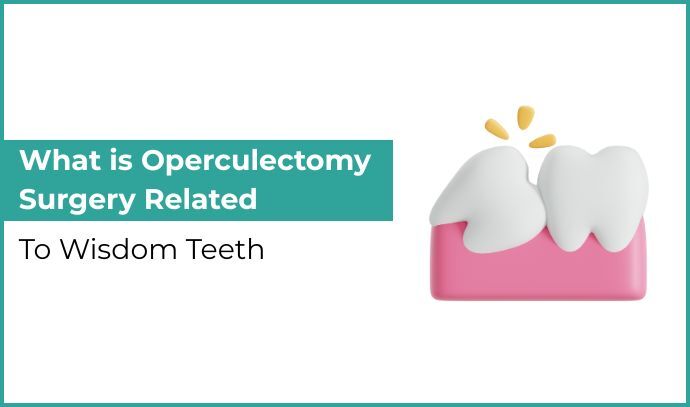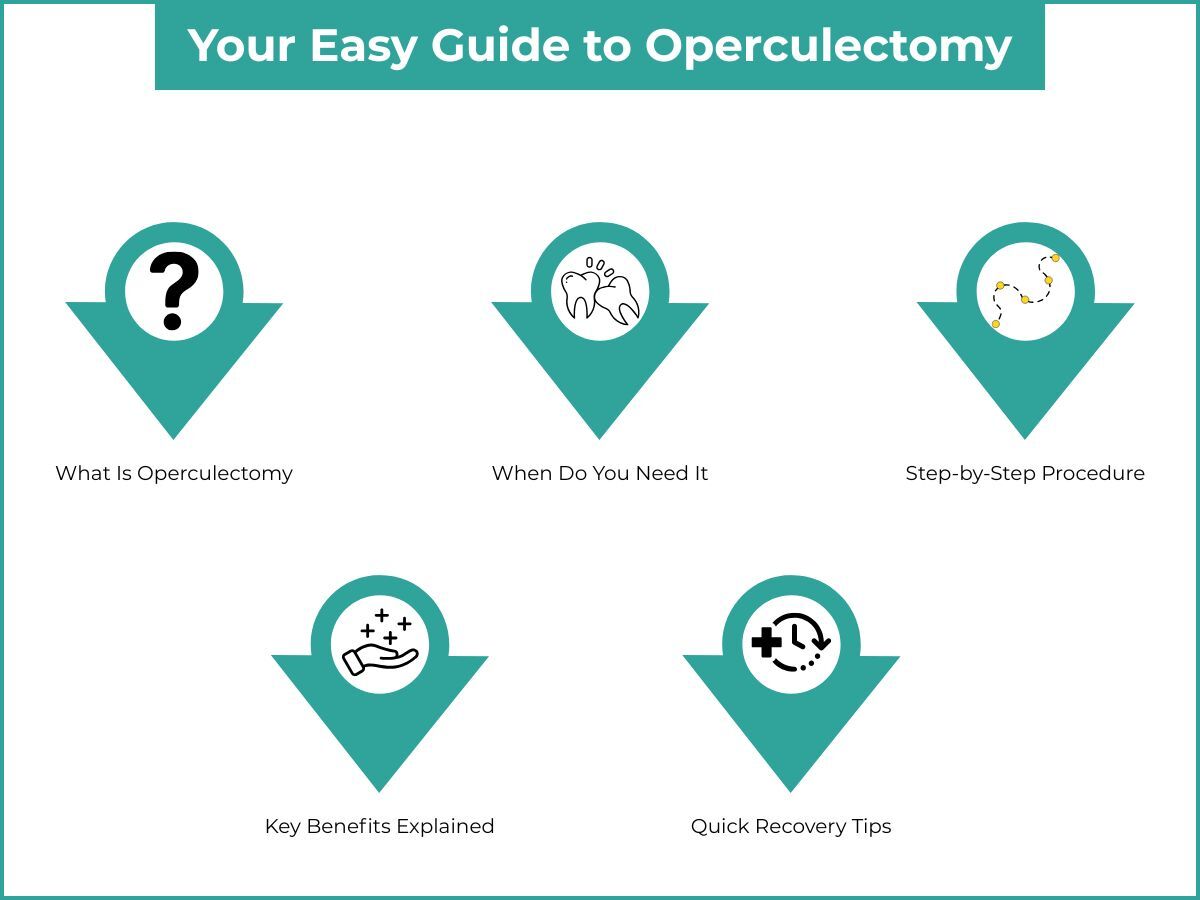
What is Operculectomy Surgery Related To Wisdom Teeth
Wisdom teeth are the last set of back teeth, and they usually show up between the ages of 17 and 25. For some people, they come in smoothly and never cause any trouble. But in many cases, there just isn’t enough room for them to grow the right way. When that happens, the tooth might only come out halfway and stay partly covered.
This is where a small flap of gum, called an operculum, can form over the tooth.
At first, this flap might not look like a big deal. But because it sits at the very back of the mouth, it’s tricky to clean properly with a toothbrush or floss. Food and germs often get stuck under it, which can lead to swelling, pain, and even repeated infections.
To solve this problem, dentists may recommend a minor procedure called operculectomy surgery.
Now, you might be wondering: “What exactly is operculectomy surgery?” or “When do I really need it for wisdom teeth?” That’s exactly what we’ll break down in this blog. We’ll cover the symptoms you should watch for, how the procedure is done, what recovery feels like, and when it’s the right time to visit a dentist.

Understanding the Gum Flap (Operculum) and Its Problems
An operculum is just a small piece of gum that partly covers a wisdom tooth that hasn’t come out fully. Because it sits right at the back of the mouth, it’s very hard to clean with a toothbrush or floss.
As a result, food and bacteria can easily get trapped under it, causing an infection called pericoronitis. Signs of this infection may include:
- Redness and swelling of gums.
- Sharp or throbbing pain around the wisdom tooth.
- Food is getting stuck repeatedly.
- Bad breath or unpleasant taste.
- Difficulty opening the mouth or chewing.
- Occasional pus discharge in severe cases.
Pericoronitis can flare up again and again, creating long-term discomfort. If ignored, the infection may spread to nearby tissues, the jawbone, or even other teeth.
That’s why dentists recommend operculectomy as a preventive and curative measure.
What is Operculectomy Surgery?
Operculectomy surgery is a minor oral surgical procedure where the gum flap (operculum) covering the wisdom tooth is carefully removed.
The goal is simple:
- Eliminate the flap that traps bacteria.
- Preserve the wisdom tooth if it is healthy and functional.
- Reduce the chances of infection and improve oral hygiene.
Unlike tooth extraction, operculectomy only targets gum tissue, making it a quicker and less invasive procedure.
When is Operculectomy Needed for Wisdom Teeth?
Not everyone with wisdom teeth needs this surgery. Dentists usually recommend it in the following scenarios:
- Repeated Infections: If you experience frequent gum swelling and pain near your wisdom tooth, it could be due to bacteria under the operculum.
- Food Impaction: Small food particles constantly get stuck under the flap, causing bad breath and discomfort.
- Pericoronitis: Ongoing or recurring infection of gum tissue.
- Difficulty in Cleaning: The flap prevents proper brushing and flossing, increasing decay risk.
- Chewing Problems: The gum flap gets bitten during chewing, causing bleeding or pain.
- Preventive Care: Before orthodontic treatments or braces to avoid future infection.
If any of these apply, your dentist may suggest operculectomy to protect both your wisdom tooth and overall oral health.
Step-by-Step Operculectomy Procedure
At Elite Dental Studio, we follow a safe, precise, and patient-friendly process for operculectomy. Here’s what to expect:
-
Examination & Diagnosis
- Clinical evaluation of your symptoms.
- X-rays to check wisdom tooth position.
- Sometimes, 3D scans for better accuracy.
-
Anaesthesia
- Local anaesthesia is given to numb the area.
- Ensures a completely painless experience.
-
Surgical Removal of Gum Flap
- The gum tissue covering the tooth is carefully trimmed.
- Advanced tools like soft-tissue lasers may be used for precision and reduced bleeding.
-
Cleaning & Disinfection
- The area is thoroughly cleaned.
- Antibacterial rinses ensure no infection remains.
-
Healing Phase
- Since the procedure is minimally invasive, stitches are often not required.
- Healing usually occurs within a few days.
Benefits of Operculectomy Surgery
Choosing operculectomy for wisdom teeth offers several benefits:
- Pain Relief: No more swelling or gum discomfort.
- Improved Oral Hygiene: Easier brushing around wisdom teeth.
- Prevents Recurrent Infections: Stops pericoronitis episodes.
- Tooth Preservation: Keeps wisdom teeth intact if healthy.
- Faster Recovery: Quick healing compared to extractions.
- Minimally Invasive: Less bleeding, no stitches in most cases.
Recovery After Operculectomy
Most patients recover in 2–5 days. To ensure smooth healing:
- Eat soft foods like soups, yogurt and rice.
- Avoid spicy, hard or hot foods initially.
- Rinse with lukewarm salt water after 24 hours.
- Avoid smoking and alcohol for at least 48 hours.
- Take prescribed medications as directed.
- Resume brushing gently after a day, avoiding the treated area initially.
Risks and Considerations
Like any surgical procedure, operculectomy has minor risks, though they are rare when performed by experts. These include:
- Mild bleeding or swelling.
- Temporary soreness.
- Risk of operculum regrowth (in some cases).
- Rare chances of infection if aftercare is ignored.
Your dentist will discuss these risks and ensure you are well-prepared.
Operculectomy vs. Extraction: Which is Right for You?
Many patients ask whether they should go for an operculectomy or a full wisdom tooth extraction. Here’s a quick comparison:
| Aspect | Operculectomy | Extraction |
|---|---|---|
| What is removed? | Gum flap only | Entire tooth + gum tissue |
| When recommended? | Healthy tooth with gum flap issue | Decayed, impacted, or problematic tooth |
| Invasiveness | Minor | Moderate to major |
| Recovery time | 2–5 days | 7–10 days |
| Tooth preserved? | Yes | No |
Dentists usually recommend operculectomy first if the wisdom tooth is healthy and functional. Extraction is reserved for cases where the tooth is impacted, decayed or causing alignment issues.
Why Choose Elite Dental Studio for Operculectomy Surgery?
When it comes to oral surgeries, choosing the right dental team makes all the difference. At Elite Dental Studio:
- We use advanced laser-assisted techniques for precision.
- Our dentists have expertise in minor oral surgeries like operculectomy.
- Patient comfort is our priority; procedures are painless and minimally invasive.
- Conveniently located for patients seeking a dental clinic in Calicut or a dental clinic in Kochi.
- Transparent guidance on whether you need operculectomy or extraction.
Restoring Comfort and Oral Health with Operculectomy!
Wisdom teeth can be a real hassle for many people. If you notice swelling in the gums, get frequent infections, or just can’t keep your wisdom tooth clean no matter how much you brush, there’s a simple fix. It’s called operculectomy.
In this procedure, the dentist removes the small flap of gum that sits over your wisdom tooth. Once that’s gone, food won’t get stuck as easily, and the chances of pain or infection go down a lot. The best part is that your tooth stays safe, and you feel much more comfortable.
At Elite Dental Studio, we help with everything from regular dental checkups to small surgeries like this, so you don’t have to live with constant discomfort.
If your wisdom tooth has been troubling you, don’t ignore it. Come see us at Elite Dental Studio in Calicut or Kochi and we’ll help you find relief.
Frequently Asked Questions:
What is operculectomy?
It’s a quick fix where the dentist just removes that little flap of gum covering your wisdom tooth. That flap is the one that keeps trapping food and causing irritation.
When would I need it?
Usually when the gum around your wisdom tooth keeps getting sore, swollen, or infected. If food keeps getting stuck there and you’re tired of the pain that’s when this treatment helps.
Does it hurt?
Not at all during the procedure. The dentist numbs the area first, so you won’t feel a thing. Afterward, it may feel a bit tender, kind of like a small cut healing, but it goes away in a few days.
How long before I feel normal again?
Most people are back to eating normally in 2–5 days. Stick to soft food for a bit, rinse with warm salt water, and you’ll heal faster.
Is it better than pulling the tooth out?
If the wisdom tooth itself is fine, yes. It’s easier and less invasive to just remove the gum flap. Taking the whole tooth out is only needed if the tooth is damaged or causing bigger problems.
Have Dental Problem : Call us
CALICUT: +91 9745 072 555,
KOCHI: +91 9567 124 888
KANNUR: +91 9645874777
or make an Appointment
Take a smiling selfie and we'll Simulate your new smile See What Invisalign treatment could do for you!




